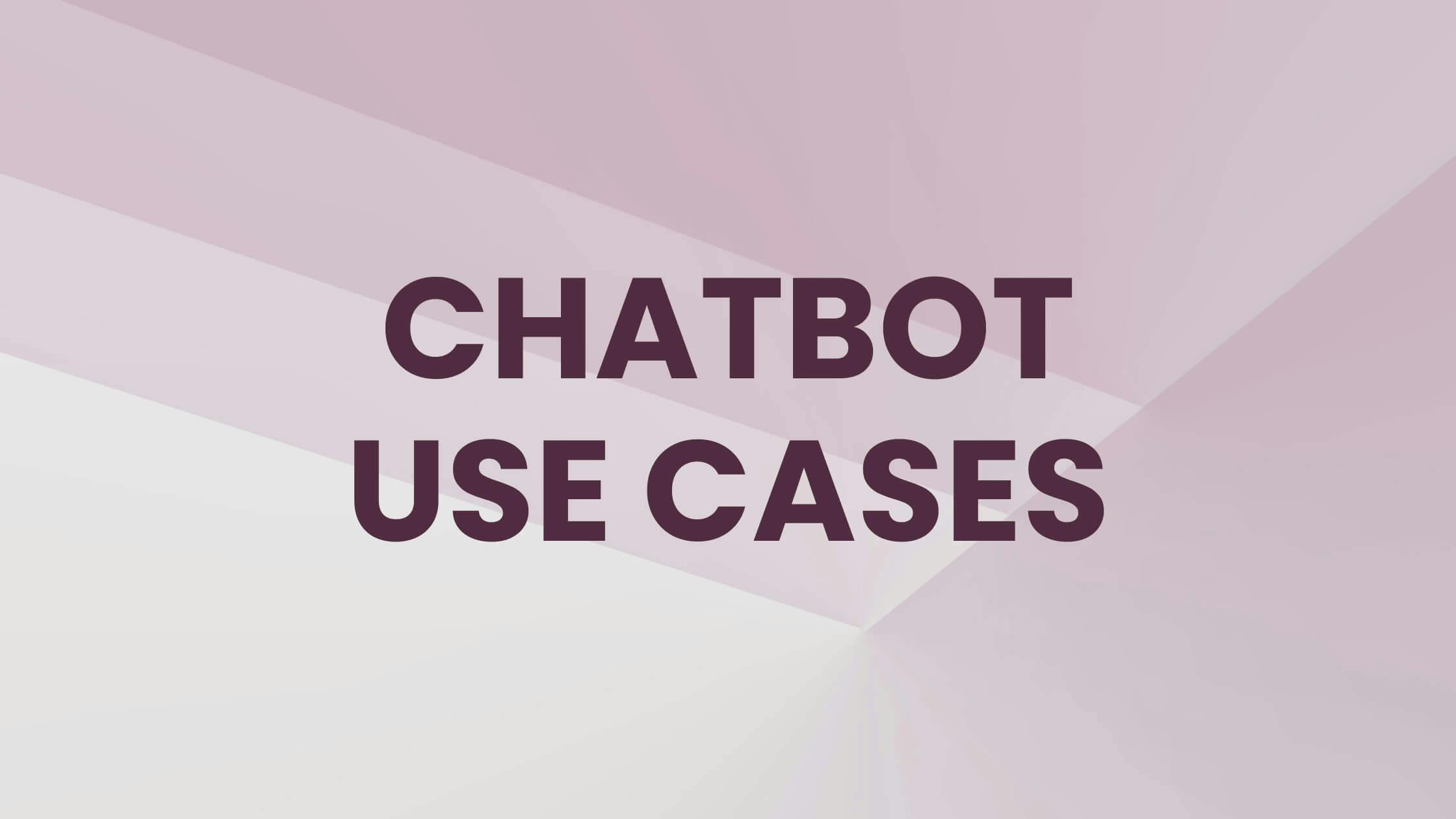Helpful Summary
- Overview: We share 10 chatbot use cases across diverse industries, emphasizing their role in enhancing customer service, operational efficiency, and workflow optimization.
- Why You Can Trust Us: Chatling's chatbots are powered by advanced AI, offering multilingual support and scalable solutions. We have a proven track record in various sectors, including healthcare, SaaS, and e-commerce, showing significant improvements in efficiency and customer interaction.
- Why It Matters: Chatbots offer a cost-effective solution by reducing staffing and operational expenses. They also help deliver valuable data-driven insights that refine marketing strategies and improve overall customer satisfaction.
- Action Points: Consider integrating chatbots into your organizational operations for improved customer service, efficient booking systems, dynamic sales support, streamlined healthcare appointment settings, or effective event management.
- Further Research: Visit the Chatling blog for more practical tips and strategies to help seamlessly integrate chatbots into your workflows.
Managing client inquiries efficiently and improving operational workflows are pressing challenges for many organizations today. As industries grow increasingly competitive, the ability to quickly respond to customer needs and streamline processes becomes not just advantageous but essential.
Fortunately, innovative solutions like chatbots are proving to be game-changers. By exploring various chatbot use cases, you’ll see how these tools enhance customer service and improve overall efficiency and productivity.
In this Chatling article, we dive into 10 chatbot applications that are reshaping industries.
Ready to streamline your operations and enhance customer satisfaction? Let’s explore how.
- Why Listen To Us?
- What is a Chatbot?
- Benefits of Implementing Chatbots
- Enhanced Customer Service
- Increased Efficiency
- Cost Reduction
- Lead Generation
- Personalization
- Gathering Insights
- Criteria to Consider When Choosing a Chatbot Solution
- Integration Capabilities
- Customization Options
- User Experience
- Scalability
- Security and Compliance
- Analytics and Reporting
- 10 Popular Chatbot Use Cases
- 1. Customer Service
- 2. Booking and Reservations
- 3. Employee Onboarding
- 4. Sales Assistance
- 5. Healthcare Appointments
- 6. Financial Services
- 7. Educational Support
- 8. Personal Assistants
- 9. Event Management
- 10. Real-time Language Translation
- Leverage the Power of Chatbots With Chatling
Why Listen To Us?
At Chatling, our authority in the field of chatbot technology is built on a foundation of rigorous research, innovative development, and real-world applications. That's why startups and large organizations rely on our tool to enhance customer interactions and streamline operations.

Our team comprises seasoned experts in AI, machine learning, and customer interaction systems, ensuring that our insights are accurate and actionable.
You can trust the information we share because it reflects our comprehensive understanding and practical knowledge gathered over the years.
What is a Chatbot?
A chatbot is an AI-driven tool that automates client conversations and certain admin tasks through messaging platforms. It enables businesses to respond instantly and effectively to customer inquiries without waiting for human assistance.
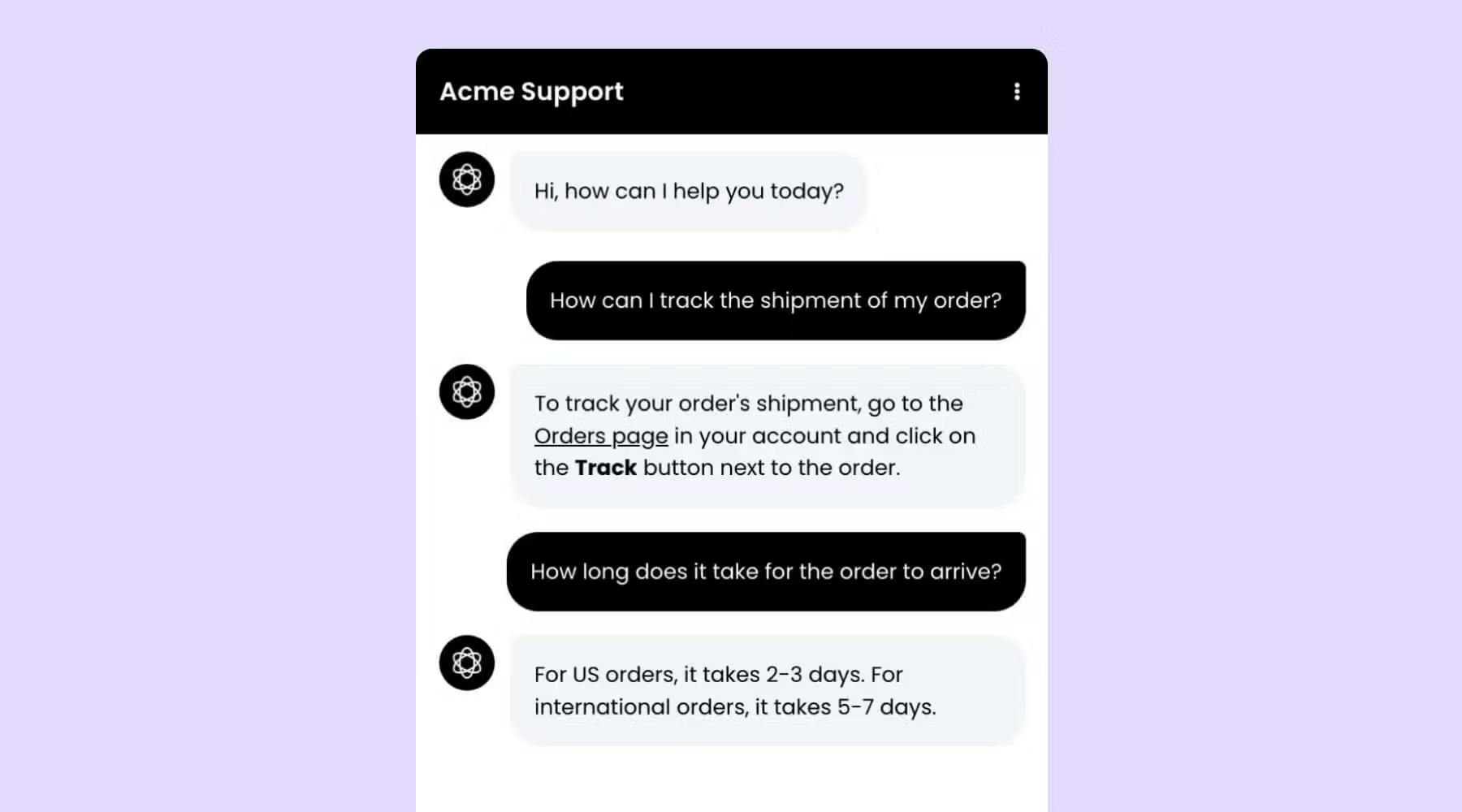
Chatbots can be programmed to perform various functions, from answering FAQs to providing personalized recommendations and support. They are particularly effective in managing high volumes of customer interactions without the need for human intervention, making them a valuable asset in many industries.
With the help of natural language processing (NLP) and machine learning, chatbots can understand and process user requests, learn from the data, and become more efficient.
Benefits of Implementing Chatbots
Chatbots offer a range of advantages that can significantly transform business operations, enhancing both customer interaction and internal processes. Here’s how chatbots are making a difference:
Enhanced Customer Service
Chatbots are available around the clock, providing immediate responses to customer inquiries. This constant availability ensures no customer query goes unanswered, regardless of the time or day.
By handling routine questions, chatbots free up human agents to tackle more complex issues, thus improving the overall customer service experience.
Increased Efficiency
One of the primary advantages of chatbots is their ability to streamline operations. Chatbots can manage multiple conversations at once, something that would require a much larger team of human employees.
This capability not only speeds up response times but also increases the efficiency of your workforce by allowing human employees to focus on tasks that require human insight.
Cost Reduction
Implementing chatbots can lead to significant cost savings for businesses. By automating routine tasks, you can reduce staffing costs and reallocate those resources to other areas. Furthermore, chatbots reduce the likelihood of errors in customer service, which can be costly to rectify.
Lead Generation
Chatbots are highly effective for lead generation—both in capturing potential customer information and nurturing leads.

By engaging users in conversation, chatbots can identify interest levels, suggest relevant products, and guide users through the decision-making process.
Personalization
Through interactions, chatbots can personalize the customer experience by remembering user preferences and previous interactions. This personal touch can make customers feel valued and increase loyalty to your brand.
Personalization is especially important in industries like retail, where a tailored experience can directly influence buying decisions.
Gathering Insights
Chatbots can collect data from each interaction, providing businesses with valuable insights into customer preferences and behaviors. This data can be used to tailor marketing strategies, improve products and services, and make informed business decisions.
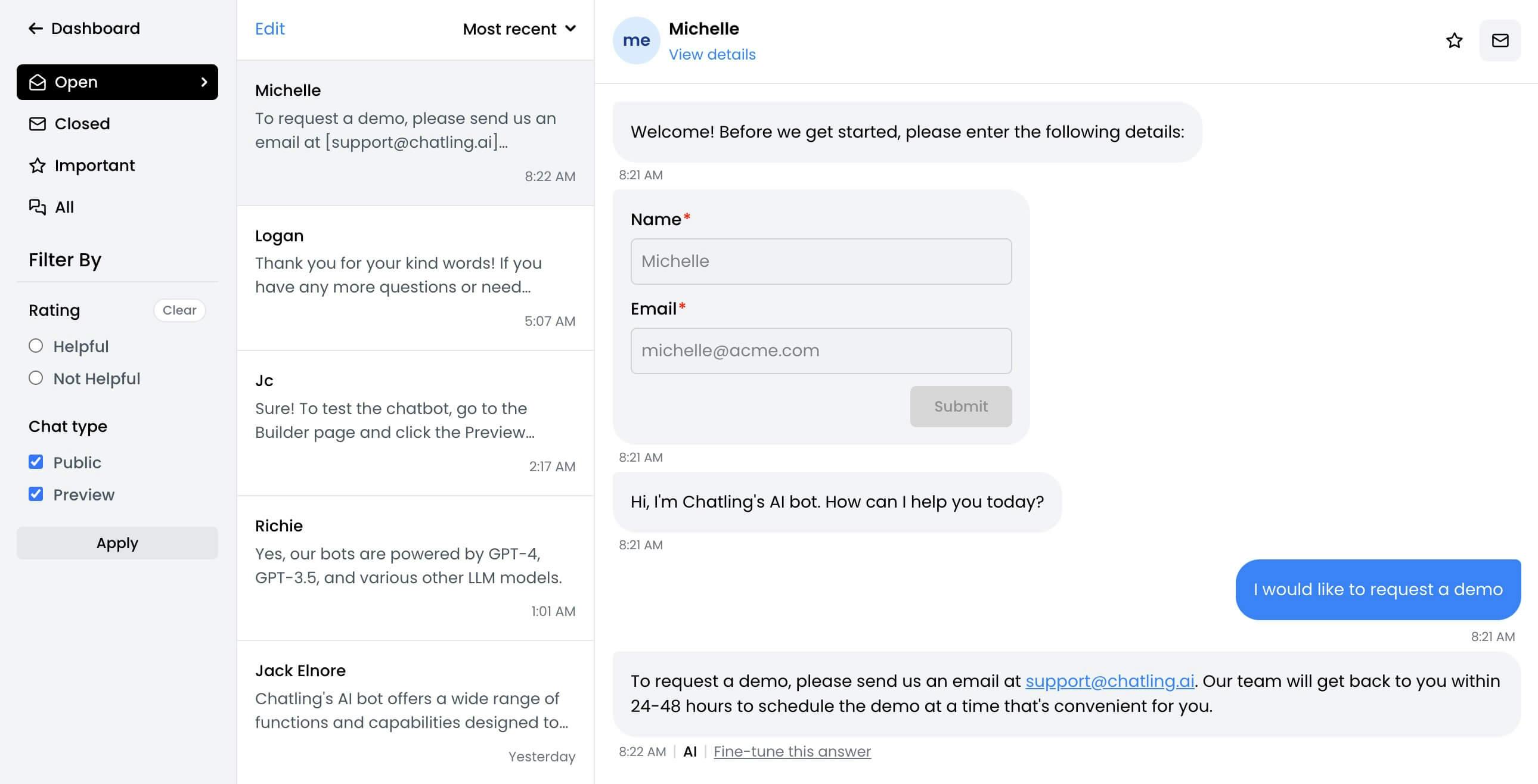
Criteria to Consider When Choosing a Chatbot Solution
When considering integrating a chatbot into your business operations, you need to assess several key factors to ensure you choose the right solution that meets your needs.
Here are the crucial aspects to keep in mind:
Integration Capabilities
The best chatbots seamlessly integrate with your existing business systems, such as CRM platforms, e-commerce systems, and customer service software. For example, Chatling offers robust integration options that make it easy to connect with these tools without requiring extensive modifications.

This compatibility is vital for maintaining a smooth flow of information across different operational functions.
Customization Options
Each business is unique and requires a chatbot that can be tailored to match your brand voice as well as meet the needs of your clients.
Chatling, for instance, allows you to customize the dialogue flows, responses, and the degree of human intervention required, ensuring that the chatbot aligns closely with your business processes and objectives.
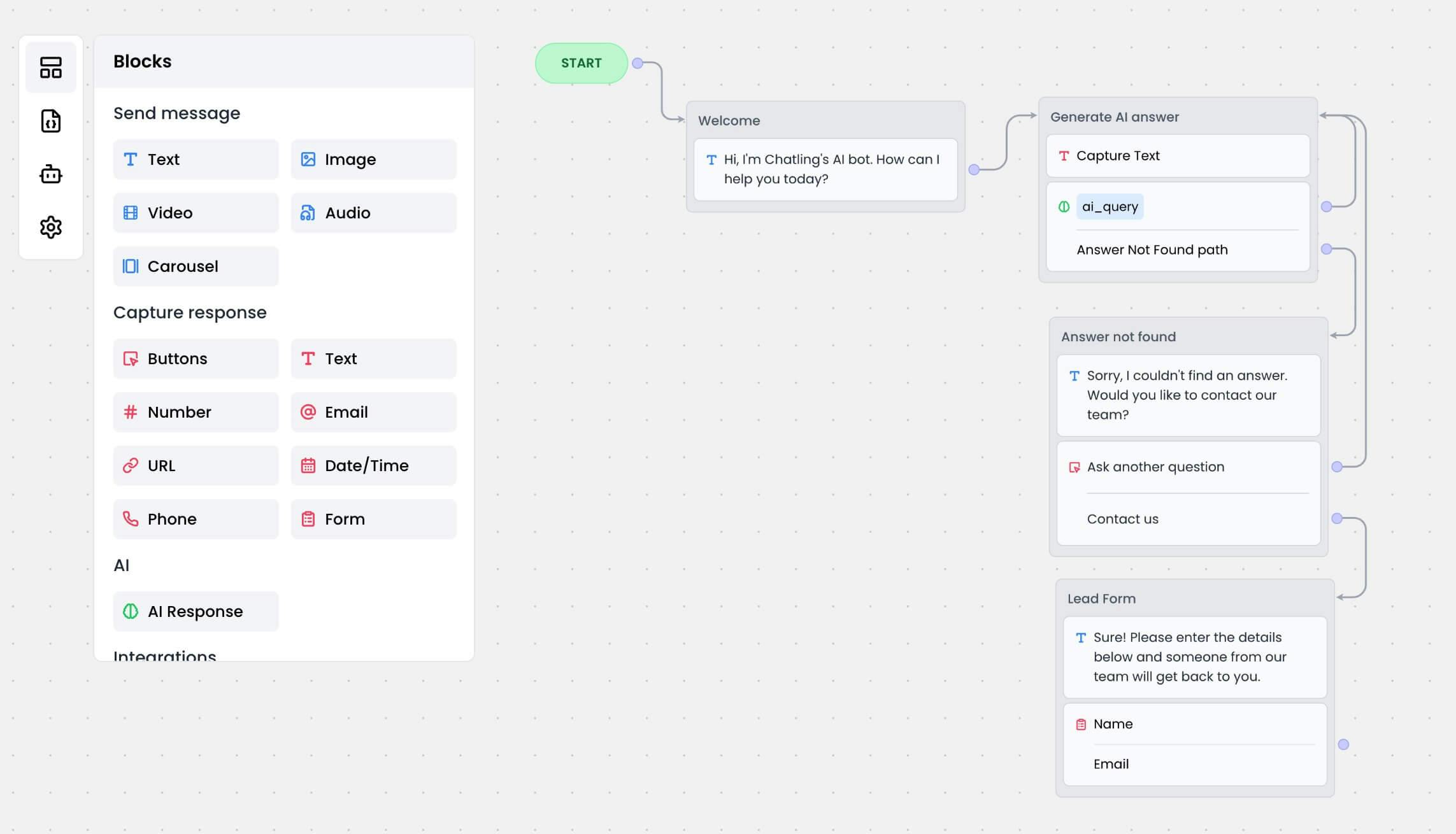
User Experience
The effectiveness of a chatbot is largely determined by its user interface and the quality of its interactions. A chatbot should be easy to use and capable of handling inquiries with conversational accuracy.
Below is a snapshot of Chatling’s intuitive UI.
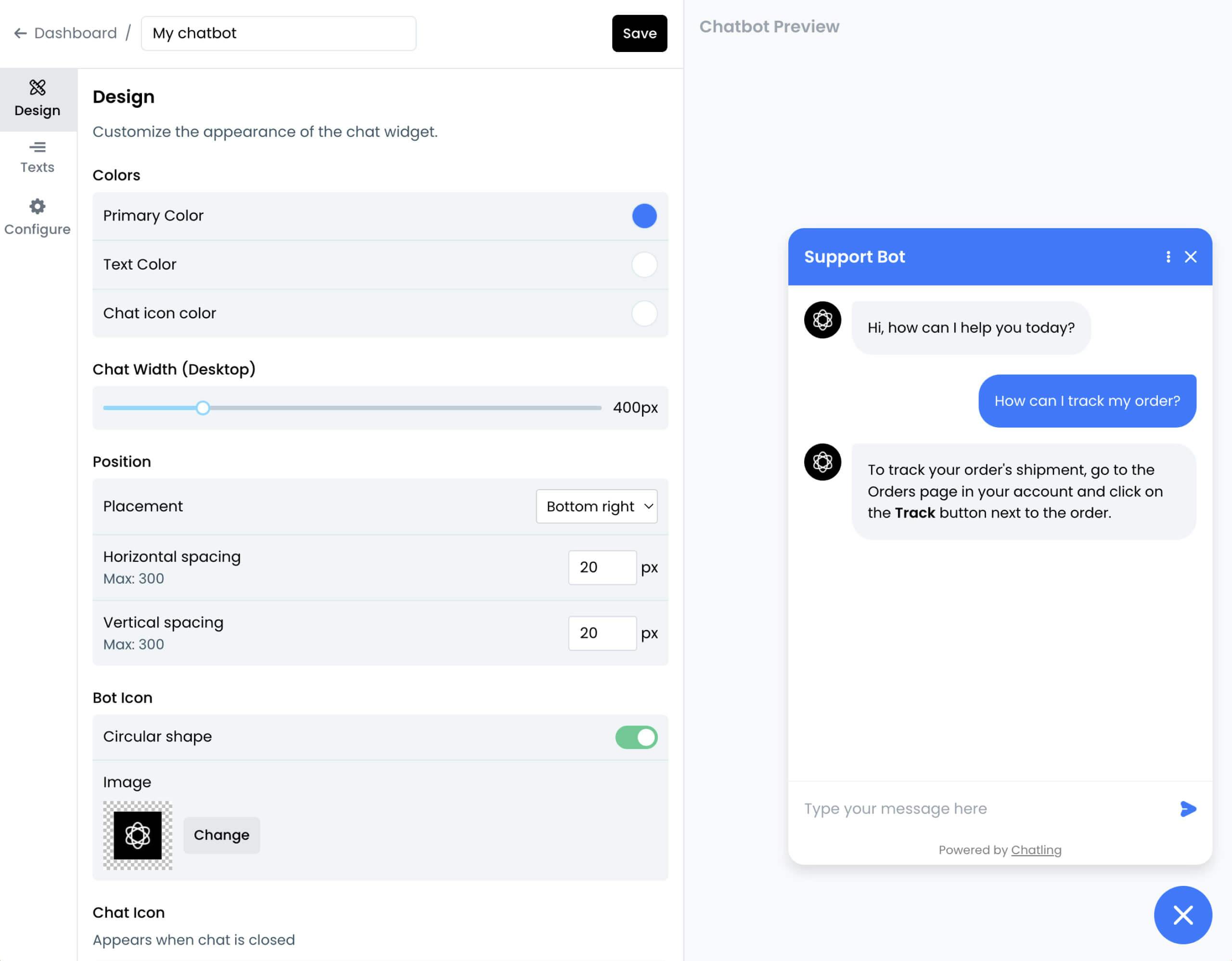
Poor user experience can deter customers, so choosing a chatbot known for its intuitive design and smart conversational abilities is important.
Scalability
As your business grows, so will your customer interactions. It's crucial to select a chatbot that can scale accordingly. This means being able to handle a greater volume of chats without performance lagging or the system crashing.
Scalability ensures that your chatbot will continue to perform effectively as your business expands without requiring a complete overhaul.
Security and Compliance
With increasing regulations on data protection, it’s essential to choose a chatbot that adheres to legal standards, especially in industries dealing with sensitive information.
Ensure the chatbot you select complies with data protection laws like GDPR, HIPAA, or others relevant to your location and industry. Security features to look for include data encryption and secure data storage practices.
Analytics and Reporting
The ability to track and analyze interactions is another important factor. Chatling, for example, provides detailed analytics to help you understand customer behavior, identify common issues, and measure the chatbot’s performance.
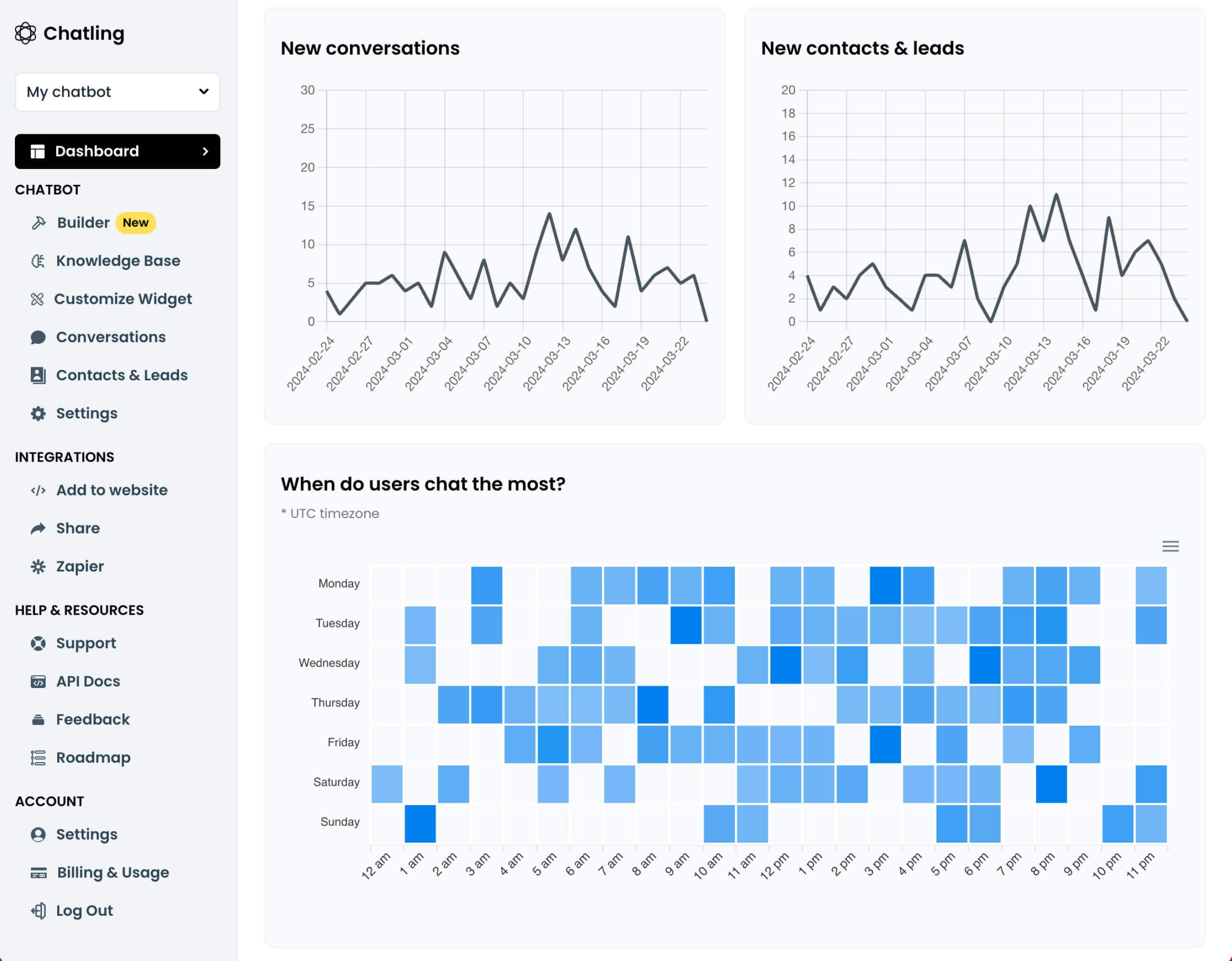
This information is crucial for continual improvement and optimizing your chatbot to serve your customers better.
10 Popular Chatbot Use Cases
Chatbots have found their way into almost every industry, offering unique solutions to common problems and enhancing the customer experience. Here are ten popular chatbot use cases that showcase their versatility and impact:
1. Customer Service
Chatbots, such as those powered by Chatling, are transforming customer service by providing immediate, around-the-clock responses to customer inquiries.
Chatling’s chatbots, equipped with multilingual AI, can interact with customers in over 85 languages, ensuring that language barriers do not hinder customer service.
This feature is especially useful in global markets, where businesses must cater to a diverse customer base.
Additionally, Chatling's chatbots are designed to deliver accurate and precise answers using advanced AI models like GPT-3.5 and GPT-4, ensuring that customer queries are handled efficiently and effectively.
2. Booking and Reservations
Chatbots are invaluable in the travel and hospitality sectors for managing bookings and reservations efficiently. They can handle everything from hotel reservations to flight bookings without human intervention.
For example, a hotel chatbot can manage room bookings, provide information about availability, and even upsell services such as spa treatments or room upgrades.
This capability enhances customer convenience and optimizes revenue for the business by maximizing upselling opportunities.
3. Employee Onboarding
Chatbots are increasingly used in human resources to streamline the onboarding process for new hires. They can provide new employees with essential information, guide them through the necessary paperwork, and answer frequently asked questions about company policies and procedures.
This use of chatbots helps HR departments to manage onboarding at scale, particularly in large organizations or during peak hiring periods. It ensures new hires have a smooth and informative start to their new roles without overwhelming HR personnel.
4. Sales Assistance
Chatbots also play a pivotal role in boosting sales by providing personalized assistance to customers navigating online stores. For example, Chatling's AI-powered chatbots analyze user behavior to suggest products that meet the customer's preferences and previous shopping patterns.
These chatbots can manage entire transactions, simplifying customers' purchasing process and reducing cart abandonment rates.
5. Healthcare Appointments
Chatbots are becoming increasingly crucial in healthcare settings by facilitating appointment scheduling, sending automated reminders, and providing preliminary consultations based on symptoms described by patients.
For instance, a healthcare chatbot could manage the entire appointment booking process, allowing patients to select their preferred dates and times without needing to speak directly with office staff.
Additionally, these chatbots can offer basic health advice and triage symptoms to direct patients to the appropriate care level, significantly optimizing patient flow and reducing unnecessary doctor visits.
6. Financial Services
In the financial sector, chatbots serve a variety of roles, from assisting customers with account inquiries to helping them execute transactions like transfers or bill payments.
For example, a banking chatbot could provide customers with real-time updates on account balances or recent transactions, and even offer financial advice based on spending patterns.
These chatbots enhance customer experience by providing quick responses and personalized financial insights, which can help customers make better-informed decisions about their finances.
7. Educational Support
Chatbots are reshaping the educational sector by providing students and educators with immediate access to information and administrative support. In educational institutions, chatbots can assist students with tasks like course registration, accessing academic records, and answering FAQs about campus facilities and event schedules.
For instance, a university chatbot might guide a student through enrollment, suggest courses based on their major, and provide deadlines for academic submissions. This enhances the student experience by making administrative tasks more manageable and allows educational staff to dedicate more time to teaching and student support.
8. Personal Assistants
In the corporate world, chatbots function as personal assistants to help manage day-to-day tasks, which can significantly boost productivity within an organization. These chatbots can schedule meetings, manage emails, set reminders for important tasks, and even handle travel arrangements.
For example, a chatbot integrated into a company's communication platform could coordinate meeting times between multiple employees, considering each individual's calendar and preferences.
By automating routine administrative tasks, chatbots free up employees to focus on more strategic and creative tasks, ultimately enhancing workplace efficiency.
9. Event Management
Chatbots are proving to be invaluable in the event management sector by streamlining the process of handling event registrations, engaging with attendees, and managing inquiries about event details. A chatbot can manage the entire registration process for an event, from collecting attendee information to processing payments.
Additionally, during the event, chatbots can provide real-time updates about schedules, venue changes, and sessions, enhancing the attendee experience.
For instance, at a conference, a chatbot could inform participants about upcoming panels or changes in the location of certain talks, ensuring everyone has the latest information at their fingertips.
10. Real-time Language Translation
Chatbots equipped with real-time language translation capabilities are crucial for businesses operating in multilingual environments. Chatling, for example, excels in this area with its multilingual AI support, which can seamlessly communicate in over 85 languages.

This feature allows Chatling to offer real-time translation during interactions, eliminating language barriers that could impede customer service.
Imagine a scenario where a customer in Japan receives immediate assistance in Japanese from a Chatling-powered chatbot, even though the company is based in the United States and operates primarily in English.
This capability not only enhances communication but also broadens your business reach. This way, your services become accessible and efficient for a diverse global audience.
Leverage the Power of Chatbots With Chatling
As we have seen, chatbots are transforming many industries by enhancing customer interactions, streamlining operations, and broadening accessibility through multilingual support.
Are you ready to leverage their numerous benefits? Chatling offers a robust platform equipped with advanced AI capabilities to suit various needs.
Whether you're aiming to improve customer service, automate tasks, or expand your market reach, Chatling provides the tools necessary to achieve these goals efficiently.
Create your free Chatling account today and experience the power of advanced chatbot technology firsthand!
